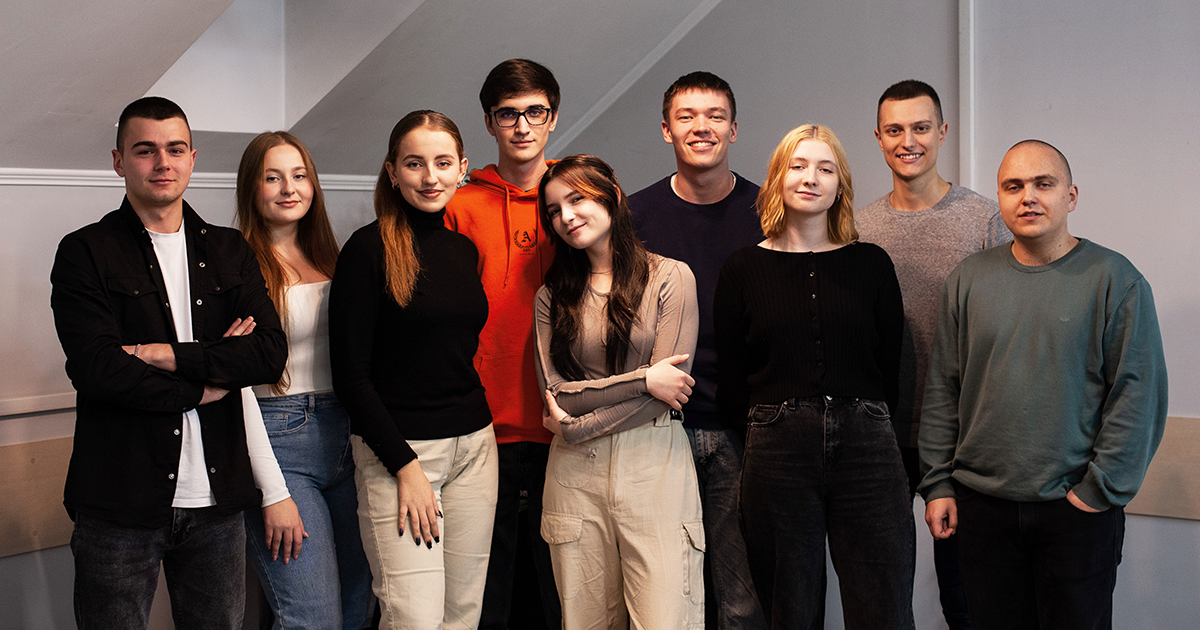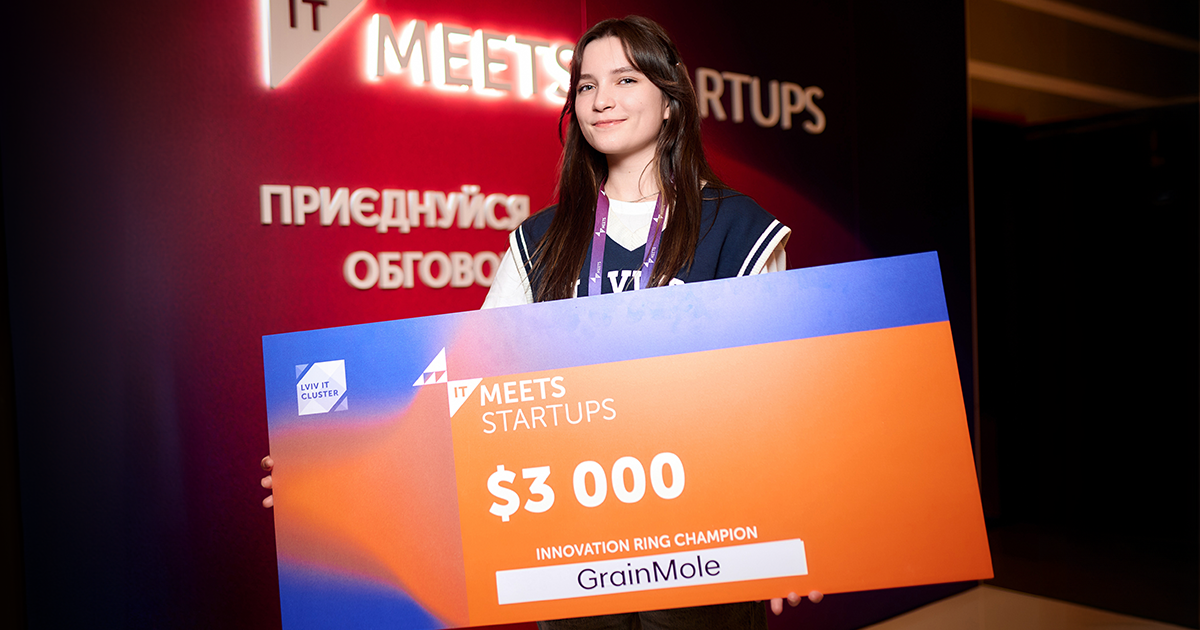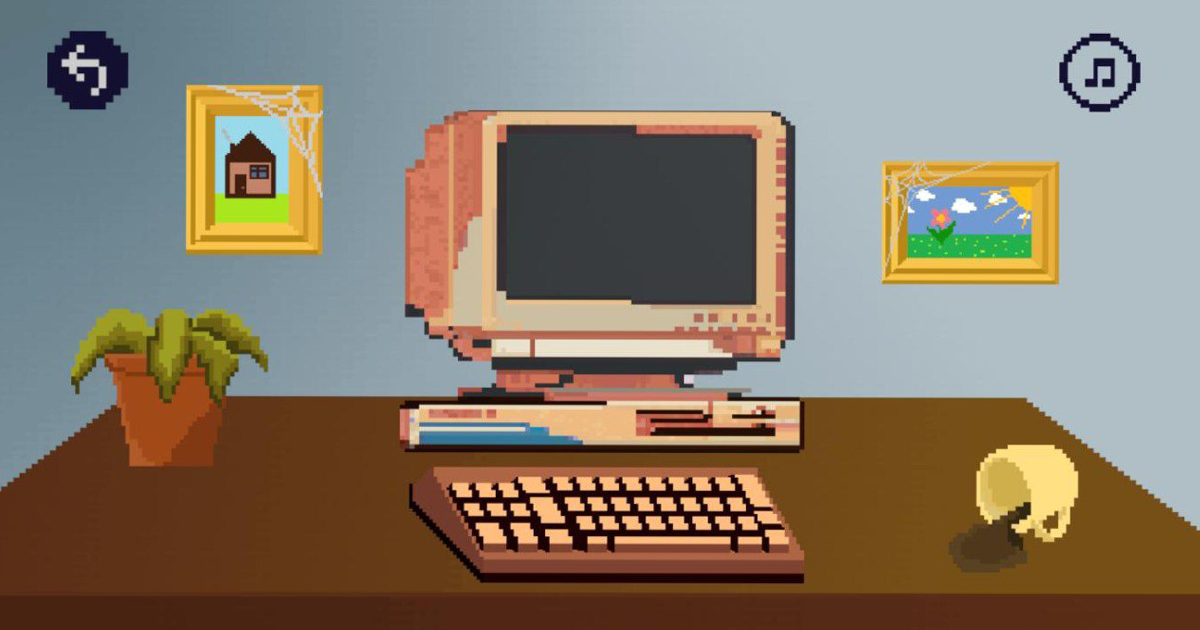Lviv IT Cluster is systematically working to ensure that young people in Ukraine receive high-quality education that meets modern market demands. The tech industry’s continued development relies on nurturing young talent.
As part of the IT Expert project, the Lviv IT Cluster supports 19 Bachelor’s programs across four Lviv universities. From their first year, students form teams and create their own projects under the guidance of mentors and industry experts, while also gaining practical experience in tech companies. The most promising ideas evolve into real startups, attracting investor interest and securing funding. Below, we highlight the best student projects.
Smart grain monitoring system
Second-year students from the Internet of Things educational program at Lviv Polytechnic have created an invention that has already made waves in Ukraine and abroad. Their GrainMole system analyzes grain conditions and predicts spoilage during long-term storage in floor warehouses.

The startup idea emerged in summer 2021 when Mykhailo Voitovych, then an applicant, was helping his father on the farm. He had to manually measure the harvested grain’s temperature daily. Later, at university, he began developing the GrainSens project with like-minded peers. The team won the CIG R&D Lab competition and qualified for the PUSB 2023 competition in Poland. By then, they had developed their first prototype, which they tested at the Peremysliv Agro farm. Subsequently, they joined forces with another student group working on a similar project called AquaMole, leading to the formation of the GrainMole team.

“Our project received a significant boost when we completely rebranded and streamlined all our team processes. This made our work more efficient. Currently, we are finalizing the development of our second MVP. We have a completed website, and we’re motivated to continue growing,” says Maria Mashkovska, CEO & Co-Founder of GrainMole.
The students are convinced that their invention is needed in the agricultural sector. Nearly a quarter of the farmers surveyed noted that the system would save them both money and time, as it allows for the remote monitoring of grain conditions. Sensors read data every hour, which is then displayed as graphs.
In April this year, the team won the title of Startup Battle Champion at the IT Meets Startups conference in Kyiv. The students received $3,000 and a spot in the startup alley at the largest and most prestigious competition in Ukraine, the IT Arena Startup Competition.

Digital friend
A team of six enthusiastic third-year students from the Robotics educational program at Lviv Polytechnic presented a project based on machine learning. Mirror is a web application that uses artificial intelligence technology to create a virtual clone of a person.

Here’s how the program works: users upload text conversations, audio, or video files of the person they want to interact with. This can be anyone from a real friend to a famous personality. The web application processes these data, and the generated model responds to user queries in text or voice. The digital clone communicates in a style typical of the specific person and mimics their behavior.
The talented startupers demonstrated their technology using the example of the singer Kuzma Skryabin.
“Our model behaves like a real person: it speaks with pauses, sometimes stumbles. It feels as if you are actually talking to Kuzma as if he is right there with you,” says the team’s Project Manager, Roman Kisil.
The application can be used for entertainment and educational purposes, such as learning foreign languages. Users can train the model to converse in any language using the voice of their favorite celebrity.
One of the application’s advantages is its autonomy. The service does not require constant monitoring or intervention from the development team. Users simply provide the necessary data, and the AI models learn independently.
The students plan to add a feature to the application that allows communication with the digital clone in video format. The generated model will move its lips, creating a more realistic presence effect.
Programmer life simulation
Six first-year students from the Business Analytics & Data Science program at Lviv Polytechnic have created an educational computer game for children called Code. With the help of this game, kids can learn various programming languages. The startup aims to help students acquire basic knowledge and try out coding in a playful format. The girls believe this will assist children in choosing a future profession and deciding whether they want to pursue programming.
“Each of us faced a difficult choice between where and what to study. With our game, children can understand if they like programming and whether they should connect their lives with development. We wish such a game existed when we were younger,” says Tetiana Soroka, the team lead and main designer of the team.

At the start of the project, the team surveyed school students to understand their main needs. The survey showed that children primarily want to learn C++, JavaScript, and Python. Currently, the game offers lessons in C++. The application’s advantage over other competitors on the market is the availability of the Ukrainian language.
The plot is built on the principle of simulating a programmer’s life. The game was developed on the Unity platform in pixel format. On the first level, the character works on an old computer in a shabby room with cobwebs on the paintings. After successfully completing each level, the player can improve the room and the main character’s equipment. There are currently three levels available in the game.

The team plans to add in-game currency to the app. After completing a level, players will receive a certain amount of the currency that they can spend on upgrading the game world. Additionally, the students want to diversify the game with a rating system to motivate students, create tests to reinforce knowledge, and add two more programming languages. The students also plan to monetize their project: the first five levels will be free, and players will then have the option to purchase a subscription for a month, six months, or a year.
To learn more about the Bachelor’s programs offered by the Lviv IT Cluster and to apply for admission, please follow the link.
Lviv IT Cluster is systematically working to ensure that young people in Ukraine receive high-quality education that meets modern market demands. The tech industry’s continued development relies on nurturing young talent. As part of the IT Expert project, the Lviv IT Cluster supports 19 Bachelor’s programs across four Lviv universities. From their first year, students […]
https://itcluster.lviv.ua/wp-content/uploads/2024/06/obkladynka.png